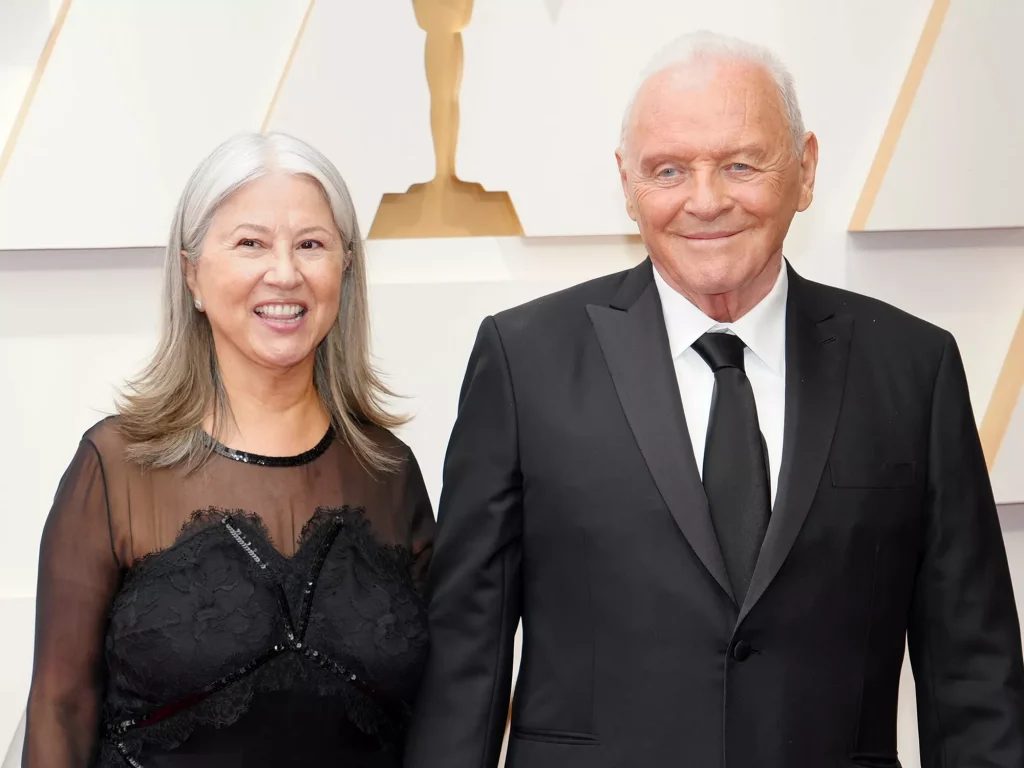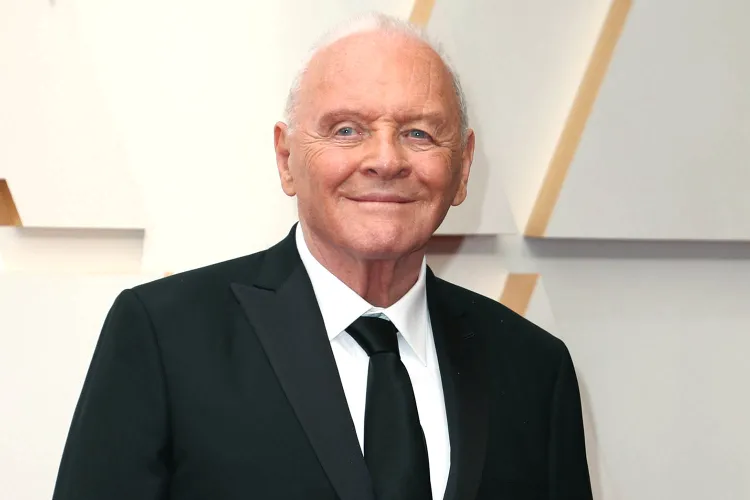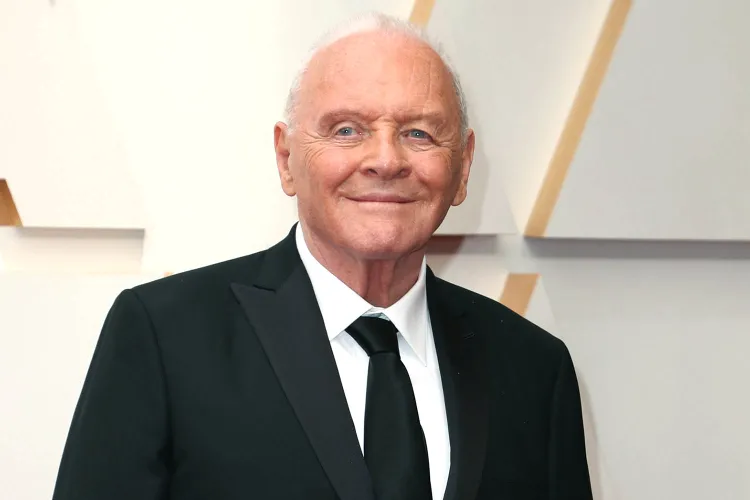Anthony Hopkins Says His Wife Believes He May Have Autism — But the Oscar Winner Calls Diagnoses “Nonsense” and Refuses to Be Defined by Labels
Anthony Hopkins has never been one to follow expectations, and that extends beyond his craft as one of the world’s most revered actors. At 87 years old, the two-time Academy Award winner continues to surprise fans with his honesty, wit, and self-awareness — qualities that have defined both his work and his public persona for decades. In a recent conversation, Hopkins opened up about something deeply personal: his wife’s belief that he may have autism. While he didn’t dismiss her observation entirely, he made it clear that he isn’t interested in labels or psychological categorization. “It’s all nonsense,” he said with characteristic bluntness. “I’ve lived my life perfectly fine without worrying about what box I fit into.”

Hopkins’ wife, Stella Arroyave, has been a steady presence in his life for over two decades. Married since 2003, she has often spoken about her husband’s unique way of seeing the world. According to Hopkins, Stella once mentioned that his intense focus, emotional detachment from certain social settings, and tendency to obsess over details might be traits consistent with autism spectrum disorder. But for the Welsh-born actor, such labels mean little compared to lived experience. “I’ve always been different, that’s all,” he explained. “When I was a boy, I didn’t fit in anywhere. I didn’t know why, and I didn’t care. I was too busy daydreaming.”
For Hopkins, the idea of being “different” is nothing new. Growing up in Port Talbot, Wales, he was an introspective child who preferred drawing, music, and solitary walks to playground chatter. Teachers found him distracted, often lost in his thoughts. “I was a terrible student,” he once said. “Completely disinterested. I just wanted to escape.” That sense of isolation followed him into adulthood, and even as his career took off, Hopkins admitted that he often felt like an outsider in the entertainment industry. “I’ve always found social situations difficult,” he revealed. “I don’t like parties. I don’t like small talk. I prefer sitting in silence or reading a book.”
Despite his discomfort with social norms, Hopkins’ career flourished because of his ability to channel his intensity inward. That same focus led to some of cinema’s most unforgettable performances, from the chilling precision of Dr. Hannibal Lecter in The Silence of the Lambs to the fragile brilliance of Anthony in The Father, for which he won his second Oscar in 2021. Directors and co-stars have long commented on his ability to memorize pages of dialogue instantly, a talent that Hopkins attributes to “some strange wiring” in his brain. “I’ve always had a photographic memory,” he said. “I don’t know why. I just see things clearly — details, patterns, rhythms. It’s all there.”

It’s this sharpness, this relentless attention to detail, that has led some observers — and even his wife — to speculate that he might be on the autism spectrum. But Hopkins’ reaction to that idea reflects his lifelong skepticism toward psychological definitions. “People love to analyze,” he said with a laugh. “They want to put everything in neat categories. But life doesn’t work that way. We’re all a bit odd, a bit mad in our own ways.” His tone wasn’t dismissive, just pragmatic — a reflection of someone who has spent a lifetime observing human behavior through the lens of art rather than diagnosis.
Hopkins’ perspective stems partly from his experiences with addiction and recovery. For much of his early career, he battled alcoholism, a struggle that nearly derailed his life before he found sobriety in 1975. Since then, he’s spoken openly about how that transformation changed everything for him. “I was lost,” he once said. “When I stopped drinking, I saw the world differently. I realized how fragile life is, how easily we can destroy ourselves by clinging to false identities.” That journey taught him to distrust external definitions, even well-meaning ones. “The moment you label yourself, you limit yourself,” he explained. “I’d rather just live.”
His comments about being “cynical” toward diagnoses have sparked conversation among fans and professionals alike. Some praised him for his candor, while others expressed concern that dismissing diagnoses could be perceived as undermining mental health awareness. But Hopkins’ words, when taken in context, reveal a more nuanced view — one that acknowledges individuality above categorization. “If I do have autism, then fine,” he said simply. “It doesn’t change anything. I’ve managed to survive this long.”

Hopkins’ approach to life has always been rooted in practicality. Even at the height of fame, he’s avoided the Hollywood spotlight, preferring quiet domestic life in California with Stella and their pets. When he’s not acting, he paints, composes music, and shares snippets of his daily routine on social media — often with humor and lightheartedness. In recent years, his Instagram posts have endeared him to younger audiences, many of whom find comfort in his authenticity. “The key to life,” he once said in a video, “is to not take yourself too seriously. We’re all just passing through.”
Still, beneath the humor and humility lies an artist with an extraordinary mind. Hopkins’ ability to inhabit complex roles with precision and empathy has made him one of the most respected figures in the industry. Colleagues describe him as both enigmatic and deeply compassionate — a man whose detachment from social norms allows him to see humanity with rare clarity. “He observes people,” said one former co-star. “He doesn’t judge them. He studies them. It’s like he sees ten layers deeper than anyone else.”
That observational power, Hopkins admits, has sometimes made relationships difficult. “I’ve been married three times,” he said. “It took me a long time to understand myself and others.” With Stella, however, he found peace. “She understands me. She gives me space. She’s taught me patience.” Her suggestion that he might be on the spectrum wasn’t made in criticism but affection. “She sees how I can get lost in my own head,” he said. “But that’s who I am.”
Hopkins’ refusal to conform to social expectations is part of what makes him so fascinating. In a culture that thrives on self-definition and identity labels, he remains refreshingly uninterested in either. “I don’t belong anywhere,” he said once, smiling. “And I like it that way.” That philosophy has carried him through decades of fame, controversy, and acclaim — and it continues to define him today. “People ask me how I stay grounded,” he said. “The truth is, I don’t think about myself that much. I just keep going. That’s the secret.”
Even at 87, Hopkins shows no sign of slowing down. He continues to take on challenging film roles, compose orchestral music, and create abstract paintings that have been exhibited internationally. His curiosity, he says, is what keeps him alive. “I’m still learning,” he said. “Every day I wake up and think, ‘What can I discover today?’ That’s the joy of it.”
For those who look up to Hopkins as a creative and philosophical inspiration, his latest remarks offer a glimpse into the mind of a man who has spent a lifetime rejecting easy answers. Whether or not his wife’s observation about autism is correct, Hopkins seems entirely at peace with himself — flaws, quirks, and all. “I’ve made mistakes,” he said. “But I don’t dwell on them. I just keep moving forward. That’s all we can do.”
In an age where self-diagnosis and online discourse often dominate public conversations about identity, Hopkins’ words may sound unconventional, even old-fashioned. But they reflect an enduring truth: that a person’s worth is not defined by a label, but by how they choose to live their life. As he put it, “Maybe I am autistic. Maybe I’m not. It doesn’t matter. What matters is — I’m still here.”
His words, equal parts defiant and philosophical, sum up the essence of a man who has lived life entirely on his own terms. For Anthony Hopkins, labels come and go — but the art, the wisdom, and the humanity he’s shared with the world remain timeless.


